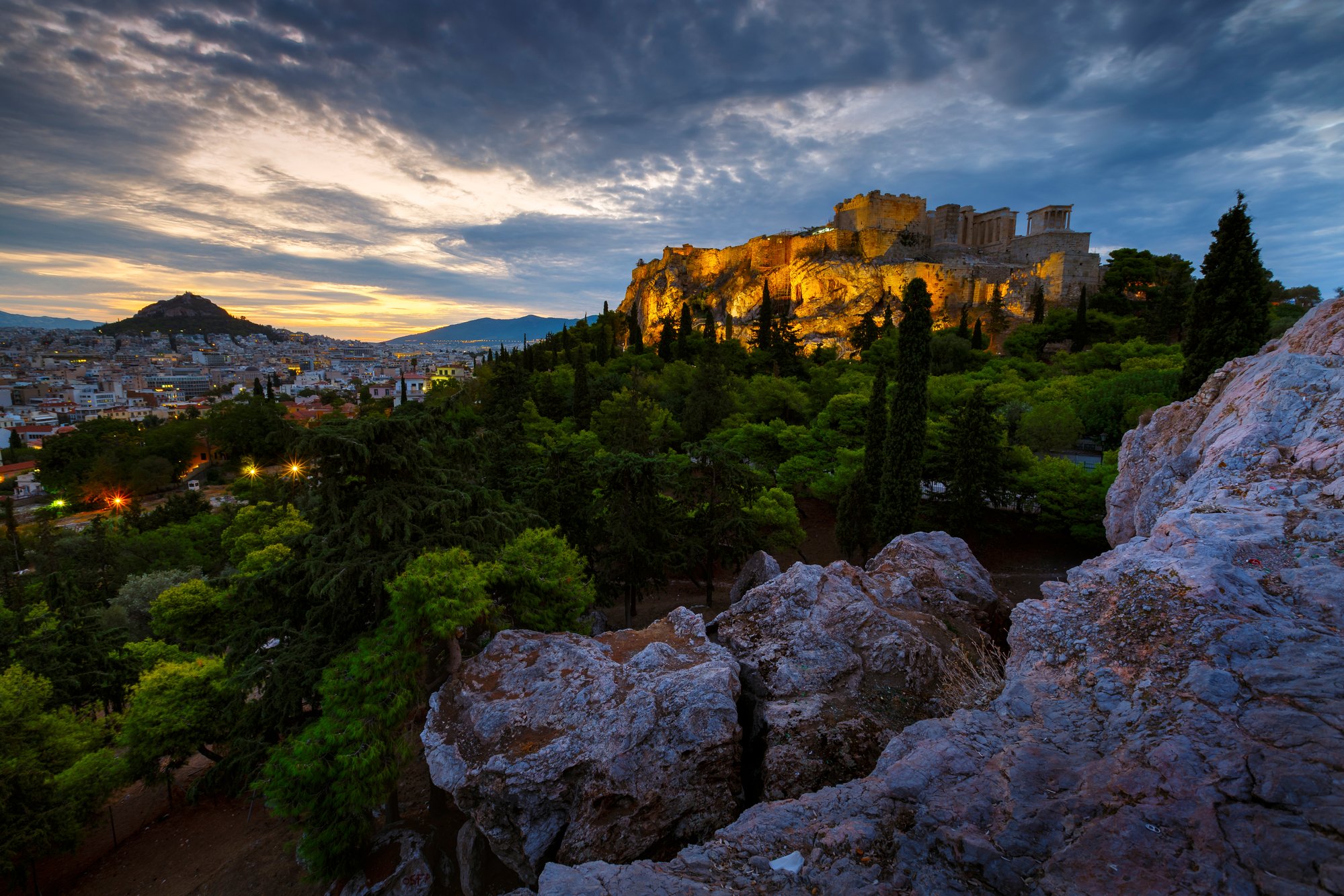The first thing that caught Paul’s eyes in the bustling streets of Athens were the many statues of pagan gods and godesses spread all over the great city-state.[i] He was on his second missionary journey, between the years 49 and 51 A.D.
There was Zeus, king of the gods and ruler of Mount Olympus; god of the sky, lightning, thunder, law, order and justice. Next to him, the statue of Hera stood as queen of the gods and the goddess of marriage, women, childbirth and family. Poseidon was next to her. The god of the oceans, water, storms, hurricanes, earthquakes, and horses. Paul walked by Demeter, the goddess of the harvest, fertility, agriculture, nature, and the seasons.
He noticed that one of the most visited and praised statue was Aphrodite, goddess of love, pleasure, passion, procreation, fertility, beauty and desire. Athena stood next to her, the goddess of wisdom, knowledge, reason, intelligent activity, literature, handicrafts, science, defense and strategic warfare.
Many people knelt before Apollo, the god of light, the sun, prophecy, philosophy, truth, inspiration, poetry, music, arts, medicine, healing, and plague. Other citizens bowed to Artemis, goddess of the hunt, the wilderness, virginity, the moon, archery, childbirth, protection and plague. And some others raised their arms in praise Ares, the god of war, violence, bloodshed and manly virtues. And so there were far more gods than he would have imagined and that Greek people and foreigners praised.
These gods and godesses were called ‘Olympians” because they resided on Mount Olympus.[ii]
Paul kept on walking until he reached a place called, the Areopagus or “Ares Hill” for the Greek and “Mars Hill” for the Romans.
Paul stopped his wandering to observe an empty altar with the inscription: Ἄγνωστος Θεός” or the “Unknown God.” He smiled. He was not going to miss this great opportunity to talk about Jesus Christ to all these intellectual and well educated people.[iii]
He knew that these men liked to talk and debate about different topics. He had done that before in the synagogues, and in front of the Epicurean and Stoic philosophers; actually those philosophers had invited Paul to go to the Areopagus to talk about the ‘strange things, he was preaching about.’ So, he bravely addressed to the Greek aristocracy, philosophers and general citizens at the very center of their religious, education and government life in Athens: the Areopagus.[iv] Will they listen to him? And more important, will they believe in Jesus?
Paul’s speech on Mars Hill is considered an oratory masterpiece about the life of the Messiah; His purpose in coming to Earth, His sacrifice for all the people, and most importantly, His resurrection, proving that He was the son of the real God who was worth knowing. His talk is compared to the great statesman and orator Demosthenes’ famous speech, “On the Navy Boards,” for its eloquence, inspiration and passion.
Paul knew he had only one chance and a few minutes of their attention to tell these men about the good news of salvation from the true God.
He spoke out,
“Men of Athens, I perceive that in all things you are very religious; for as I was passing through and considering the objects of your worship, I even found an altar with this inscription: TO THE UNKNOWN GOD. Therefore, the One whom you worship without knowing, Him I proclaim to you: God, who made the world and everything in it, since He is Lord of heaven and earth, does not dwell in temples made with hands” (Acts, 17:22-24, NKJ).
Surprisingly, everyone stopped what they were doing and listened with rapt attention to Paul’s words. He didn’t want to ridicule his listeners and their beliefs. He wanted only to refute the Greek philosophies, as if they were in a high debate, (actually the Areopagus was used for exactly this purpose), something Greek people loved to do.
Paul continued telling the Athenians that this unknown God made the world, and that He is the Lord of heaven and earth, and that’s why He doesn’t live “in temples made with hands.” He also told them that God doesn’t need anything since He is the one who gives everything, even life and breath. Paul even used a quote from the book Phaenomena of the famous Greek poet Aratus of Soli, ‘For we are also His offspring,’ to present the truth of the living God.[v] He said:
“Therefore, since we are the offspring of God, we ought not to think that the Divine Nature is like gold or silver or stone, something shaped by art and man’s devising. Truly, these times of ignorance God overlooked, but now commands all men everywhere to repent, because He has appointed a day on which He will judge the world in righteousness by the Man whom He has ordained. He has given assurance of this to all by raising Him from the dead.” (Acts 17:29-31 NKJ).
Everything was going well until he said, “raising Him from the dead.” At this point, some of the listeners started to make fun of him and his words. Yet, not everything was lost. Some in the audience wanted to hear more about those “strange things.” And even some others believed and followed him. Among them, a man named Dionysius the Areopagite, and a woman named Damaris. At least, for some people the “unknown god” was becoming a real God.
The way Paul addressed the Greek shows us how to talk to people who don’t believe in God, but are intellectually capable of understanding Him. They just need someone like Paul, a faithful and fearless Christian, someone who seized the opportunity to talk about the Savior, not caring if he risked his own life. As Ellen White stated,
“The words of Paul become a memorial of the occasion, and give a treasure of knowledge to the church. He was in a position where he might easily have spoken that which would irritate his proud listeners. Had his oration been a direct attack upon their gods, and the great men of the city who were before him. But he carefully drew their minds away from heathen deities, by revealing to them the true God, whom they were endeavoring to worship, but who was to them unknown, as they themselves confessed by a public inscription.”[vi]
Our Own Gods
As for us, modern Christians, how real is God in our modern life? We don’t have statues of pagan gods adorning our paths … or maybe we do. Throughout our Christian life, we have heard many sermons about the hazards of the new age, the dangers of being a workaholic, the risks of social networks, and so on, these are real statues that surround us everywhere we walk; pagan gods that one way or another, we eagerly serve and honor.
We also, as “homo pensantis,” like to debate about God. We like to be seen as intellectual and well prepared people, able to speak theologically. But sometimes these debates are pointless, because the real object of the study is missing. We like to brag that we know everything about God, we even pretend to know what He thinks! But, at the end of the day after the debates are over, if we do not have a personal relationship with Jesus, our pedestal or plinth labeled “to the unknown god” will remain empty. He is unknown to us until we meet Him.
The words the Apostle Paul spoke that day at the Areopagus, almost two thousand years ago, are still heard today. They are addressed to those who think they don’t need anything else in life because their “gods,” supply everything they desire.
Conclusion
May God helps us to see inside our heart, like Dionysius and Damaris, and to understand that there’s no god like the real God, He who gave His son, and was “raising Him from the dead” so we can have eternal life. Do these words still sound like “strange things” to our ears?
I hope not.
****
Javier Girarte is the author of two books: “Bien, buen docente y fiel,” (ACES, 2019), and “113 Reasons why life is good!”— a teen devotional 2022. (Pacific Press). He lives in Montemorelos, Mexico.
Articles published:
References:
[i] http://www.biblestudy.org/biblepic/athens-apostle-paul-missionary-journeys.html
[ii] https://en.wikipedia.org/wiki/Twelve_Olympians
[iii] https://www.britannica.com/topic/Areopagus-Greek-council
[iv] http://www.biblestudy.org/apostlepaul/life-epistles-of-apostle-paul/introduction.html
[v] https://www.theoi.com/Text/AratusPhaenomena.html
[vi] http://www.ellenwhite.info/books/bk-slp-09.htm



